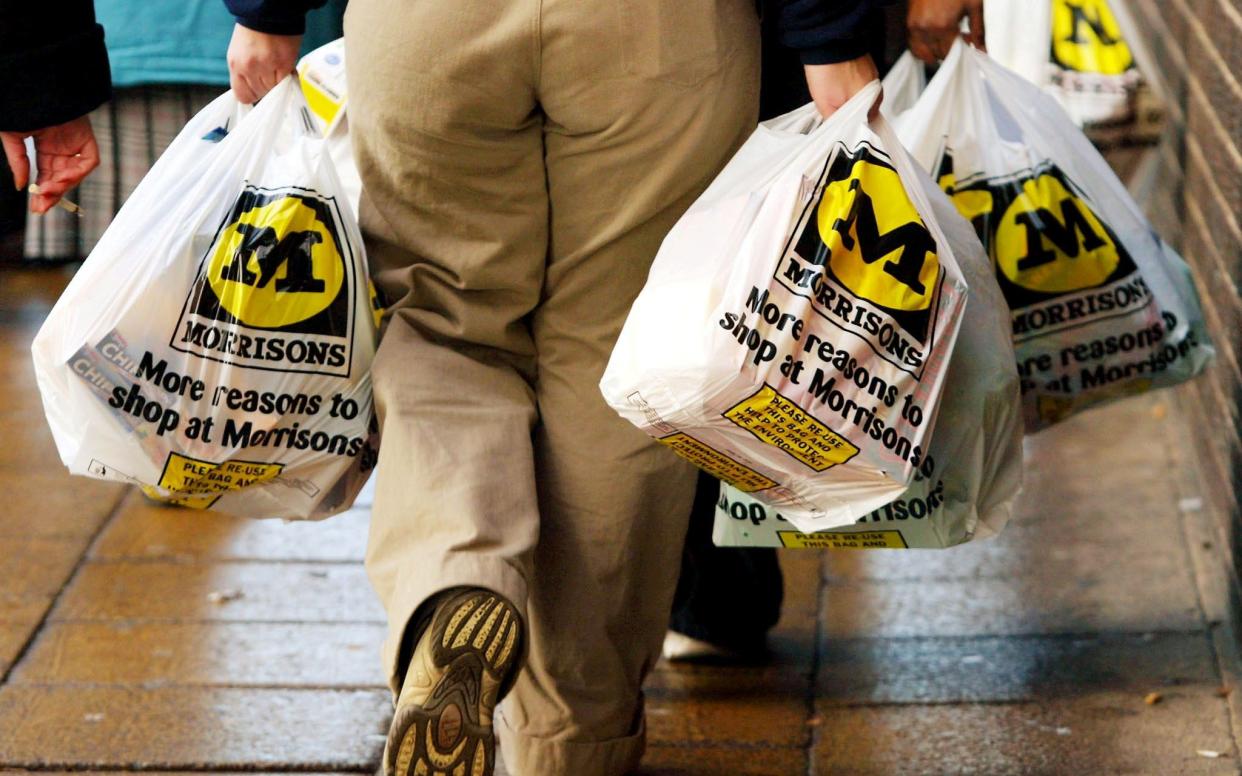Letters: The American bid for Morrisons is bad for staff, customers and Britain

SIR – We are all for inward investment. Aren’t we? It can certainly bring advantages, but there is something disturbing about the bid by American vulture funds for our much-loved Morrisons supermarket.
The City, always ready to sell its grandmother for a quick turn, is due to pick up an outrageous £300 million in fees, so is unlikely to object. Institutional shareholders, desperate to show how clever they are at stock picking, will welcome it. Only the investor Silchester has shown a sign of pro bono by voting against it.
But the staff at Morrisons, who have helped make the business a national success story – along with the millions of customers who like its consumer-friendly attitude – have ample reason to be worried.
There can be only one purpose for this takeover – and that is to strip its assets, enabling those behind it to walk away with a billion pounds. Any national benefit would appear to be non-existent: it is difficult even to begin to make a convincing case that this deal is in the national interest. In the past, Morrisons has been good to its customers, good to its farm suppliers and good to its staff. It was able to build its reputation as a sensible, well-run British company because it was well funded and consequently didn’t have to pinch and scrape to cover costs.
I wonder what the loyal staff, some of whom have worked for Morrisons for 20 years, feel about having the business sold over their heads. Shouldn’t the management, now with its nose in the trough, at least have considered giving the staff a bonus?
This would have rewarded them for their part in creating a successful and well-regarded business. It might also serve to compensate employees for rougher waters ahead and help create a better relationship with the new owners. (When I floated my company, I gave 10 per cent of the equity to the workforce.)
The bid is doubly unattractive to those affected, as it is headed up by an ex-head of Tesco, a business that has been criticised for its treatment of its suppliers and being careless over its stock-taking.
Profit-seeking in a competitive environment has played a huge role in raising living standards around the world. Food now only accounts for 10 per cent of the family budget. But the circumstances of the Morrisons deal will no doubt strengthen the hand of capitalism’s many critics.
Even if it will not act now, I hope the Government should at least learn the lessons of unbridled inward investment. It should refer takeovers above a certain size to a beefed-up Competition and Markets Authority.
It is promising that it has already indicated that it wishes to do this: the national interest, however difficult to define, must be a factor. Allowing billionaire asset strippers to walk away with another billion, leaving this country poorer, while contributing nothing in return, should be a thing of the past.
Lord Vinson (Con)
London SW1
Olympic trans rules
SIR – A problem with “trans” Olympic competitors is that men still dominate the world and think that a woman is merely a man with reduced testosterone.
Could I remind them that a woman is not a man at all? She is a woman.
Taking drugs to reduce testosterone does not a woman make.
Annabel Burton
Winchcombe, Gloucestershire
SIR – I agree with Sally Jones (Comment, August 3) that sharing medals is a cop-out.
Shouldn’t the men’s high-jumpers have shared a silver, as neither had won?
Graham Smelt
Huddersfield, West Yorkshire
SIR – Julian Mogford (Letters, August 3) wonders why the International Olympic Committee has not devised a better fastening for competitors’ badges than safety-pins.
I, like many other riders to hounds, fasten our expensive hunting ties to our shirts using even more expensive gold pins, as do Olympic equestrians, and find that it works.
Nicky Samengo-Turner
Gloucester
Chocolate Mozart
SIR – Ivan Hewett (Arts, August 3) questions the wisdom of Mozart’s last three symphonies being performed in a row during Sunday evening’s Prom concert.
I, too, found this puzzling. While there was superb playing and musicianship from the Scottish Chamber Orchestra and its conductor Maxim Emelyanychev, by the time we reached the opening bars of Mozart’s symphony No 41 (The Jupiter) I felt like Bruce Bogtrotter in Roald Dahl’s Matilda being forced to eat the last slice of Miss Trunchbull’s chocolate cake.
Jean Clark
Eastbourne, East Sussex
Rhythm and googe
SIR – As an orchestral string player, I read with interest M T Austin’s account of an oboist providing an A with very wide tremolo (Letters, August 3).
This was described as “almost a googe”. It was not a term with which I was familiar, but you can imagine the response when I typed “googe” into a well-known search engine.
So I am none the wiser.
Kate Pycock
Ipswich, Suffolk
Freedom to travel
SIR – The Prime Minister asked, on the subject of lifting Covid restrictions, “If not now, when?”
Regarding travel restrictions, if we don’t open up overseas travel this year, why should travel be opened up next year?
Anthony Booty
Angmering, West Sussex
SIR – I and thousands like me were volunteers in Covid vaccination clinical trials. We now find ourselves unable to obtain “vaccine passports” despite GPs having records of the vaccination details.
The NHS vaccination app and the paper-based passport do not include data from clinical trials. The app was supposed to be amended by the beginning of July; this was delayed until the end of July. Now, in August, there is still no progress. Thus, no volunteers are able to travel overseas.
For many like me who were part of the Novavax trial the situation is worse. I was led to believe that Novavax was submitting its dossier to the Medicines and Healthcare products Regulatory Agency in the spring of this year. To date no submission has taken place.
As I have been vaccinated with an unlicensed product there seems little hope that I will receive a vaccination passport in the near future. At present I cannot, for health and safety reasons, be vaccinated with one of the approved vaccines.
Am I, and thousands like me, to be condemned to a life of not being allowed to travel overseas because we did the “right thing” by volunteering?
Joan Meakin
Milnthorpe, Cumbria
Nuisance callers fined
SIR – Paul Arnold, the deputy CEO of the UK Information Commissioner’s Office, defends the commitment of the ICO by saying it has levied more than £13.5 million in fines to nuisance call and spam text operators since 2015 (Letters, August 2).
We all know the stress and financial damage these operators can create, so one might wonder whether a punishment of barely £2.5 million per year constitutes anything more than the most token of efforts.
Can the Government really not do better?
Mark Lewis
Aboyne, Aberdeenshire
SIR – May we ask how many of these fines have been paid?
Michael Towers
Sherborne, Dorset
Insect killers
SIR – My modern Skoda windscreen is rarely splattered with insects (Letters, August 4), but my 1952 Jowett Javelin murders them with silent aplomb.
Aerodynamics at play, perhaps?
Geoff McAuley
York
SIR – Graham Lang observes (Letters, August 3) that he gardens unhindered by insects and that there has been a huge reduction in wild birds.
I don’t doubt his experience, but wonder why in my garden I am putting elastic bands around my trouser legs to prevent widespread insect bites. And where have all my redcurrants gone?
Robert Curl
East Raynham, Norfolk
SIR – There is a lot of talk of bugs on the windscreen: surely in British English the word bug is usually used for biting insects, such as bedbugs.
Apparently, all insects are bugs now and we are all Americans.
Joseph Kerrigan
London W13
A fairer deal for full-time residents in Cornwall

SIR – David Nunn (Letters, July 31), writing about holiday homes in Cornwall, claims that he rescued a derelict hovel, bestowing work upon otherwise idle local tradespeople.
Those people might have restored that hovel for themselves or their children, had they not been priced out of the market. Has Mr Nunn thought about where they will live, and who will take over their businesses, in years to come?
Holiday and second homes are refurbished once over many years. They do not put patients on to local GP lists, nor children into the village school. They do not support the local economy all year round. Visitors do support the seasonal hospitality businesses to some extent – yet all too often we see the supermarket delivery van arrive shortly after they do, so village shops do not benefit.
Visitors are of course welcome, and are an essential part of rural and coastal economies, but there needs to be a sustainable future for local communities, so that they can maintain the scenery and services that people expect. The first step should be to ensure that every new-build home is designated for permanent residence only.
Honor Byford
Middleham, North Yorkshire
SIR – David Nunn makes valid points about holiday homes in Cornwall. The same is true in Devon.
However, he misses the point that, while local people may complain about outsiders making prices unaffordable, they are the ones who sell properties as holiday homes.
The fairest way to stabilise prices may be to introduce capital gains tax on the increase in value of primary properties.
Kate Graeme-Cook
Brixham, Devon
The risk of electric car batteries catching fire
SIR – Your article about electric car batteries catching fire (Business, August 3) was well-informed, but I would add several points.
A runaway lithium fire, which may be unlikely and tolerable in a mobile phone, becomes a more serious risk in a car – and, in a large energy storage battery, very much more so.
Recent reports of fire and explosion in Liverpool, Beijing and Chicago show that accidents are far from rare.
In Britain, it seems, the ambition to achieve net zero has led to such incidents being dismissed and has discouraged the authorities from classifying these energy stores as dangerous.
Emeritus Professor Wade Allison
Aylesbury, Buckinghamshire
Letters to the Editor
We accept letters by post, fax and email only. Please include name, address, work and home telephone numbers.
ADDRESS: 111 Buckingham Palace Road, London, SW1W 0DT
FAX: 020 7931 2878
EMAIL: dtletters@telegraph.co.uk
FOLLOW: Telegraph Letters on Twitter @LettersDesk

 Yahoo News
Yahoo News 
